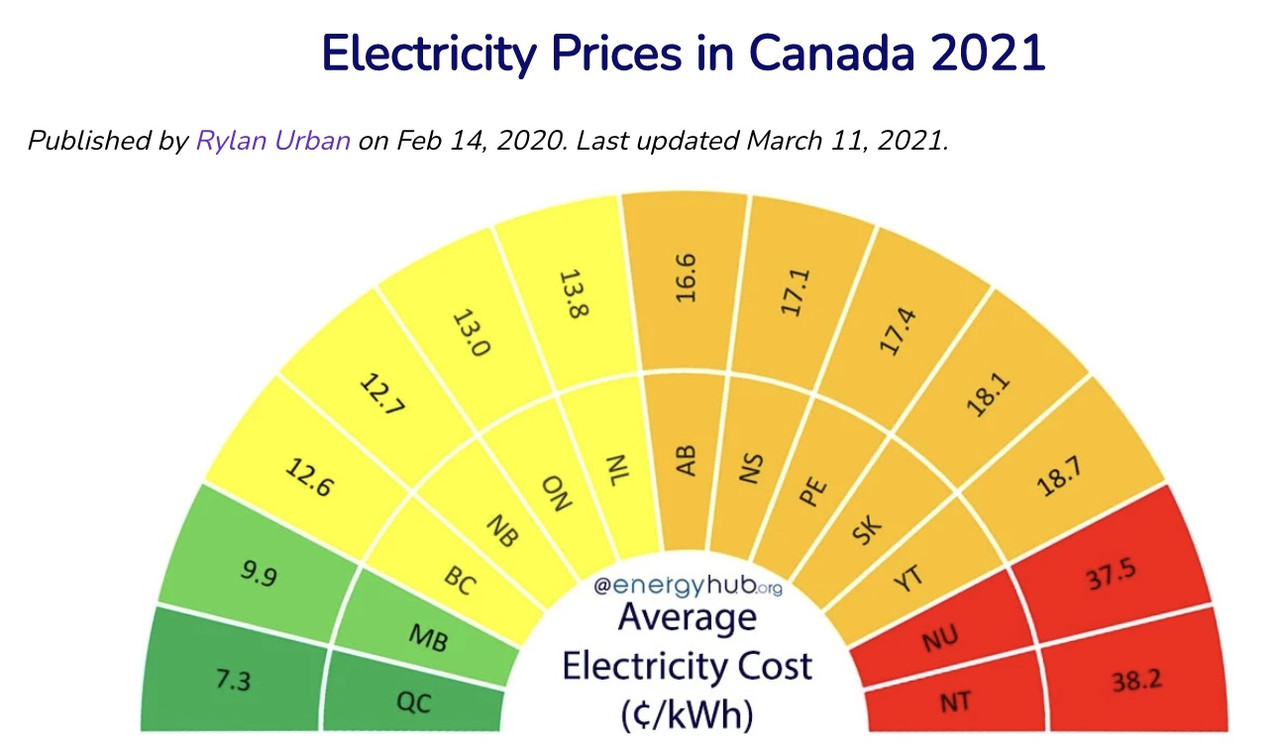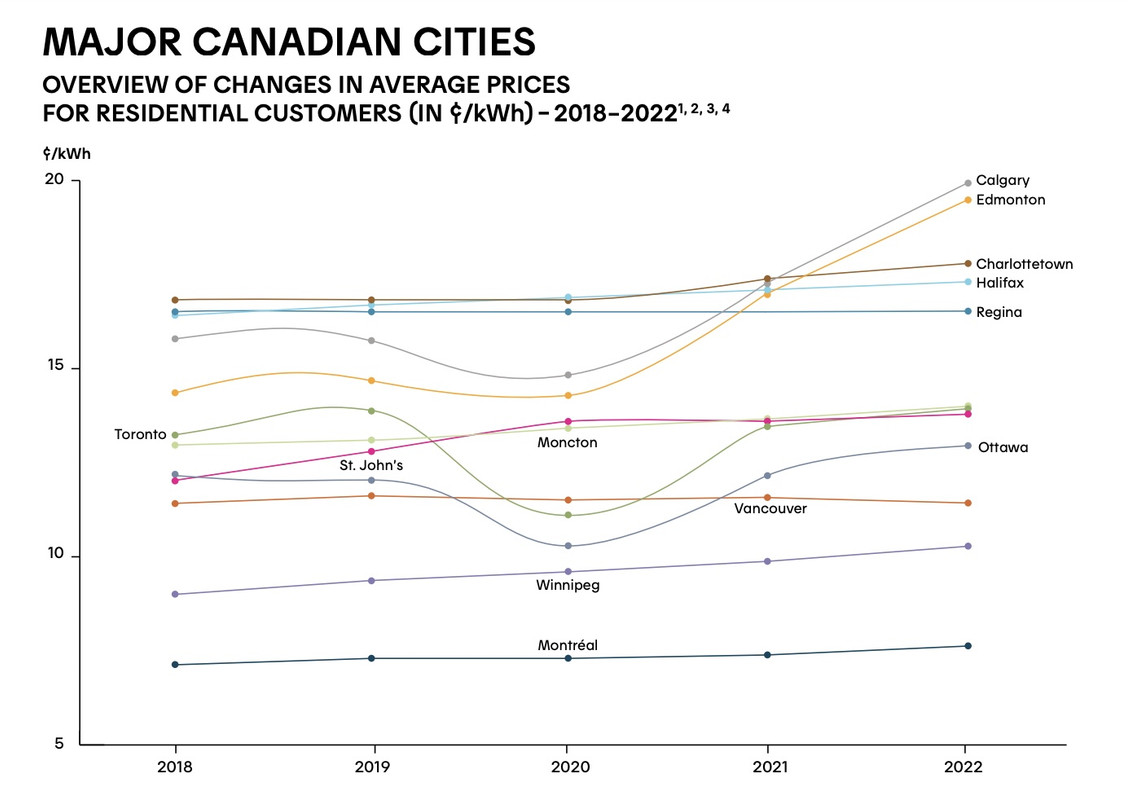MigraineCall wrote: Electricity prices vary widely across Canada:
2021:

Rates of Increase of the Cost of Power 2022:

This is a major factor that is ignored when enforcing national policy across the entire country regarding the move to abandon ICE vehicles for EVs, and helps explain why there is a big pushback from those in the high cost electricity areas.
In April 2022 in Edmonton or Calgary, residential users pay $0.20/kwh, almost three times more than in Montreal at $0.0759.
If the stuation were reversed, and it was gasoline, it would be the equivalent of the west forcing Montreal to pay $5.27 a litre for fuel while those in the west pay only $2.00 a litre. This is what the west faces with this EV push as a result of this huge electricity price discrepancy.
Driving an EV across Canada, you will be very happy rolling around through Quebec, but heading west, you had better charge up fully in MB. It will cost you dearly, a few times more per km when you have to traverse the flat lands of SK, and AB and climb up and down the mountains to finally roll down to Vancouver. Freight going across the country will have the same problem.
This situation is insane, as AB and SK could be global energy superpowers holding the third largest proven oil reserves on the planet. It is a resource rich place where its landlocked AECO gas is sometimes so cheap, it has gone negative even just a few months ago. This is the result of our abysmal stupid energy policy.
In the North, in NU or NT, it is even worse. They now pay almost 3 times as much for power as Edmonton does. When we force those in the North to abandon their ICE vehicles and fossil fuels use in favour of EVs and electrical heaters, I think there will be many stranded battery operated sleds and trucks left on the frozen tundra and ice until the sun rises again in the spring, when they can dig out their solar panels from under the ice to catch some rays to charge. Dog sleds will continue be the main means of travel. Massive subsidies will be handed out to northerners in compensation to survive the crippling energy prices we have imposed on them. Ironically, we are changing the entire world just to save them from any negative economic side effects of climate change.
We will have to change the fifth line of our national anthem as we will paralyze the North. It will be replaced with: 'Our true North Weak and Repressed'. Meanwhile foreign shipping traffic slices shipping lanes through the Northwest Passage like columns of ants at a picnic.
Clearly, one transportation solution does not work for everybody in every place. As electricity prices rise even further due to carbon taxes and eventually road taxes, it is the west and the north that will suffer most, given their present high baselines that will get pushed up even further. The breadbasket of the west is being set up to fail as this continues.
The problem is that most of the voters in Canada that elect these clowns reside in areas of dirt cheap and abundant electricity, enabling them to force their policy on others in the country deemed inconsequential, and after all, those in the west are dirty polluters anyway.
I'm looking for a PHEV myself at the moment here in Thailand, so I'm not opposed to it. I think it all boils down to policies that take into account that there are places in the world where it makes sense, and places where it doesn't. I say let the free market and economics sort it out, not a one solution approach for all.
This is creating a situation of an overstretched artificial market imbalance, where the potential grows for a big price snapback above the normal increases as oil supply is strangled, and spare capacity narrows. Eventually supply will become lower than the increasing global demand, now evidenced by depleting worldwide inventories at a pace where present EV adoption rates cannot make up the difference. This is even happening at the present time where we have all the current headwinds holding back normal demand levels.
To be more fair and realistic, I would like to see more cost benefit analysis calculations for EV adoption using data forecasts of electricity prices a few more years ahead than we are now, taking into account the constantly inflating western electrical pricing across each province in Canada, instead of basing it on the flat low utopian rates most of the population in the east now enjoy.
Experienced wrote: meritmat wrote: So my question is who in gods name is our electric grid going to handle all these chargers?
Just got done a couple of power outages last couple days granted they were weather related. Not a lot of fun. Plus last week I believe the Alberta grid sent out notice they were close to there max. Wanted people to cut back on power usage.
Want to see outrage start seeing blackouts in the province. I pity the poor government in charge. (As much as I can ever pity a government)
Great question!!
If people who will be buying EVs charge their cars at night which will most likely be the case for the majority, there is sufficient electrical genetation capacity to meet that demand for the foreseable future.
The problem is that the electrical grid in North America (don't know the situation elsehwere eg Europe) is fundamentally unstable and prone to brownouts and blackouts. Stating the obvious, this is a big problem. What will likely happen in this scenario is that electricity producers will make more money from their installed base as people use more electricity at night while at the same time companies that use a lot of electricity in their production will be vulnerable to service interruptions and peak load pricing (like what you are talking about).
This is why I have invested in companies that produce electricity and some young companies that have solutions to ensuring that companies don't suffer from service interruptions. One of these companies have I have invested in (own about 1% of the company) and related to earlier discussion here, has a technology that has emmisions that are so low that it is exempt from the carbon tax)...a big competitive advantage!!
I expect to make more money going forward from these investments over the longer run than from investments in oil companies. That said, I will invest in oil companies to play shorter term swings as opportunities emerge.